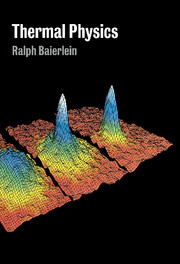Book contents
- Frontmatter
- Contents
- Preface
- 1 Background
- 2 The Second Law of Thermodynamics
- 3 Entropy and Efficiency
- 4 Entropy in Quantum Theory
- 5 The Canonical Probability Distribution
- 6 Photons and Phonons
- 7 The Chemical Potential
- 8 The Quantum Ideal Gas
- 9 Fermions and Bosons at Low Temperature
- 10 The Free Energies
- 11 Chemical Equilibrium
- 12 Phase Equilibrium
- 13 The Classical Limit
- 14 Approaching Zero
- 15 Transport Processes
- 16 Critical Phenomena
- Epilogue
- Appendix A Physical and Mathematical Data
- Appendix B Examples of Estimating Occupation Numbers
- Appendix C The Framework of Probability Theory
- Appendix D Qualitative Perspectives on the van der Waals Equation
- Index
15 - Transport Processes
Published online by Cambridge University Press: 05 June 2012
- Frontmatter
- Contents
- Preface
- 1 Background
- 2 The Second Law of Thermodynamics
- 3 Entropy and Efficiency
- 4 Entropy in Quantum Theory
- 5 The Canonical Probability Distribution
- 6 Photons and Phonons
- 7 The Chemical Potential
- 8 The Quantum Ideal Gas
- 9 Fermions and Bosons at Low Temperature
- 10 The Free Energies
- 11 Chemical Equilibrium
- 12 Phase Equilibrium
- 13 The Classical Limit
- 14 Approaching Zero
- 15 Transport Processes
- 16 Critical Phenomena
- Epilogue
- Appendix A Physical and Mathematical Data
- Appendix B Examples of Estimating Occupation Numbers
- Appendix C The Framework of Probability Theory
- Appendix D Qualitative Perspectives on the van der Waals Equation
- Index
Summary
Two paragraphs set the scene for the entire chapter. Recall that the molecules of a gas are in continual, irregular motion. Individual molecules possess both energy and momentum, and they transport those quantities with them. What is the net transport of such quantities? In thermal equilibrium, it is zero. If, however, the system has macroscopic spatial variations in temperature, being hotter in some places than in others, then net transport of energy may arise (even from irregular molecular motion). Or if the locally averaged velocity is nonzero and varies spatially (as it does in fluid flow through a pipe), then net transport of momentum may arise.
Our strategy is first to examine irregular molecular motion in its own right, then to study transport of momentum, and finally to investigate the transport of energy.
Mean free path
Our context is a classical gas. The conditions of temperature and number density are similar to those of air under room conditions. We acknowledge forces between molecules, but we simplify to thinking of the molecules as tiny hard spheres, so that they exert mutually repulsive forces during collisions. Generalization will come later.
When any given molecule wanders among its fellow molecules, its path is a random sequence of long and short “free” paths between collisions. Figure 15.1 illustrates the irregular, broken path. There is a meaningful average distance that the molecule travels between collisions.
- Type
- Chapter
- Information
- Thermal Physics , pp. 356 - 381Publisher: Cambridge University PressPrint publication year: 1999



